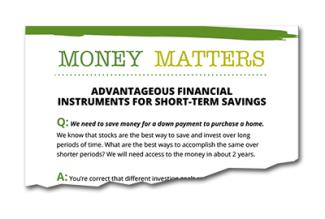
ADVANTAGEOUS FINANCIAL INSTRUMENTS FOR SHORT-TERM SAVINGS
Q: We need to save money for a down payment to purchase a home. We know that stocks are the best way to save and invest over long periods of time. What are the best ways to accomplish the same over shorter periods? We will need access to the money in about 2 years.
A: You’re correct that different investing goals require different financial instruments. The most important factor with a short-term savings goal is predictability. While a savings account is very predictable, there are options with higher yields.
Consider these financial instruments for short-term savings:
- Short-term bonds: Bonds can be purchased with a variety of maturation terms. The maturation date is when you’d get your principal back. It’s the amount of time you’re loaning your money to a company.
- Bonds can provide fixed or floating interest rates. The floating interest rate is tied to an index, such as the 90-day Treasury bill rate.
- Zero-coupon bonds do not provide interest but are sold at a discount. These bonds are redeemed for their full face value at maturation.
- Treasury bills: All T-bills mature in 12 months or less. As with zero-coupon bonds, this investment doesn’t pay interest. It is also sold at a discount relative to its face value. These are commonly considered to be the safest of all investments.
- Certificates of deposit: This could be considered a cross between a bank account and a bond. The US government insures certificates of deposit. However, it is intended that the money be left alone until maturation, like a bond. The interest and the original investment are received at the end of the term. Banks and credit unions both issue CDs.
These are three of the most common short-term investment solutions that can be used to safely save for the near future. Remember that bonds have varying risks, while T-bills and CDs are both extremely safe. Good luck with your house!
